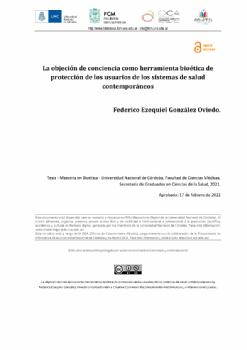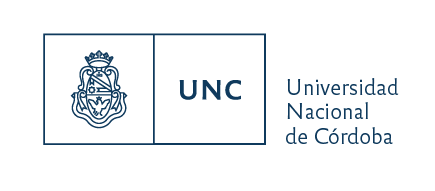| dc.contributor.advisor | Howlin, Diego Hernán | |
| dc.contributor.author | González Oviedo, Federico Ezequiel | |
| dc.date.accessioned | 2022-04-25T21:35:37Z | |
| dc.date.issued | 2022-02-17 | |
| dc.identifier.uri | http://hdl.handle.net/11086/24144 | |
| dc.description | Tesis - Maestría en Bioética -Universidad Nacional de Córdoba. Facultad de Ciencias Médicas. Secretaría de Graduados en Ciencias de la Salud, 2021 | es |
| dc.description | 128 p. | |
| dc.description.abstract | La presente tesis intenta describir las limitaciones que el concepto de objeción de conciencia posee en los profesionales enfermeros y como su aplicación en situaciones dilemáticas y controversiales, permitiría no solo usar esta herramienta como un factor protector para la conciencia del profesional, si no también hacerla extensiva al paciente. Para alcanzar dicha propuesta, se analizará el objeto de estudio de la enfermería, resaltando la importancia de la responsabilidad ética, académica y legal respecto al cuidado del paciente. Luego, el concepto de objeción de conciencia será analizado bajo la ley 24004, de ejercicio profesional de enfermería. El análisis a priori, muestra una situación de sumisión de la enfermería respecto a la medicina, siendo visible esto en el hecho de que la primera puede objetar conciencia sobre lo que indica la segunda, pero siempre bajo la obligatoriedad de encontrar un reemplazo que esté dispuesto a realizar dicha prescripción, negando la posibilidad que la prescripción per se sea no ética y, por lo tanto, colocando a la profesión médica en una posición ética distinta, y transformando a las enfermeras en simples ejecutoras de órdenes. Esto, a menudo, dejaría a los pacientes indefensos, sin una enfermera que pudiese objetar conciencia ante una prescripción que pudiese violar la máxima de las ciencias de la salud: primum no nocere. | es |
| dc.description.abstract | The present essay tries to describe the limitations that the conscientious objection concept possess for the nursing personal and how it applications in dilemmatic and controversial situations would allow not only to use the conscientious objection as a protective factor for the professional, but to make it extensive to the patient. To be able to achieve said proposal, the nursing object of study will be analyzed, highlighting the priority of the ethical responsibility, academic and legal about the care of the patient. Then, the concept of conscientious objection will be analyzed under the law 24004, of Nursing Profession Exercise. The a priori analysis grace a submissive character in the nursing professional under the medical professional, adducing that the first can object conscience to what the second prescribes, but always under the obligatoriness of finding a replacement that is willing to pursue said prescription, denying the possibility that the prescription per se is non ethical and, therefore, putting the medical professional in a different ethical position, and transforming the nurse in a simple executor of orders. What also would often leave the patient defenseless under the care of the nurse that object consciousness about a prescription that could violate the maxim of the health sciences: primum non nocere. | en |
| dc.language.iso | spa | es |
| dc.rights | Atribución-NoComercial 4.0 Internacional | * |
| dc.rights.uri | http://creativecommons.org/licenses/by-nc/4.0/ | * |
| dc.subject | Bioética | es |
| dc.subject | Discusiones Bioéticas | es |
| dc.subject | Atención al Paciente | es |
| dc.subject | Derechos del Paciente | es |
| dc.title | La objeción de conciencia como herramienta bioética de protección de los usuarios de los sistemas de salud contemporáneos | es |
| dc.type | masterThesis | es |
| dc.description.embargo | 2024-02-17 | |
| dc.description.fil | González Oviedo, Federico Ezequiel | es |
| dc.description.fil | Fil: González Oviedo, Federico Ezequiel. Universidad Nacional de Córdoba. Facultad de Ciencias Médicas; Argentina. | es |





